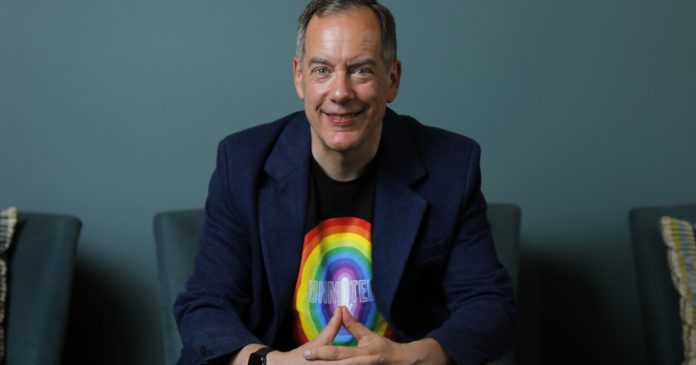
To say that Charlie Beale knows what he’s doing would be a bit of an understatement. The new artistic director of the San Diego Gay Men’s Chorus brings a considerable and significant level of education and experience to his new role, having worked as a choral director, jazz musician, music educator, composer and arranger, and author.
“One of my earliest memories is randomly pressing the piano keys at around 3 years old. I just liked how it sounded, for its own sake. I had piano lessons at 8, got into bands and choirs, and it took off from there,” he says of his musical beginnings.
As a practitioner and university professor, “I ended up spending most of my 20s teaching jazz at the college level, running Big Bands, gigging as a session player, and working a church job. After some touring and great session opportunities in jazz and pop music — including remixes of Whitney Houston and Salt-N-Pepa tracks — I ended up conducting the London Gay Men’s Chorus in 2002 and discovered that I loved working with LGBTQIA-plus choirs.”
In the late 1990s and early 2000s, he was at the Royal College of Music in London, where he taught jazz piano and directed the school’s big band. He later spent 12 seasons as conductor and artistic director of the New York City Gay Men’s Chorus, expanding its membership, increasing diversity, touring internationally, performing with the New York Philharmonic at Lincoln Center for the Performing Arts, developing programs for LGBTQ youth and elders, and performing with pop singers and Broadway vocalists. Today, he serves in leadership roles with organizations in the queer choral movement to develop and share best practices, present workshops and advocate in support of their artistic work.
Beale, 57, lives in San Diego’s Cortez Hill neighborhood with his husband of 30 years, Yuwrajh. He took some time to talk about choral singing and the queer choral movement, what he hopes to accomplish in San Diego, and how choral directors can better support marginalized groups.
Q: Welcome to San Diego and congratulations on your new role as director of the San Diego Gay Men’s Chorus. What are some of your goals, or your vision, for your work here?
A: Like all choirs, our main short-term challenge right now is to rebuild after COVID. COVID decimated the arts, and choral singing in large groups was particularly affected. SDGMC has come through strong, however, and there is a strong core of experienced and open singers who are ready to go in many different directions. Over the next year, I want to refine and develop a distinctive queer voice for our group that can communicate a message that is truly relevant to today and that speaks impactfully to the wider Southern California community. I am hoping that my pop music and musical theater experience will enable us to sing with excellence in styles that many choirs find harder, and this will broaden our audience and our appeal to all kinds of Californians. There is no point in singing in spaces where there are no listeners.
Q: Your bio on your website says that you have a “unique approach to activist choral singing.” What is “activist choral singing”?
A: For me, activist choral singing is about singing with a purpose. You’re not singing the past work of dead, White composers (though I love that stuff), but focusing on singing the music that will resonate with people and change their hearts and minds in some way. One example would be a dance-music based choral show we did in New York in collaboration with an addiction nonprofit, about crystal meth addiction in the gay community. Another would be a two-year choral project we did in collaboration with Coro Gay Cuidad de México after [Donald] Trump’s election, where two LGBTQIA+ choruses showed what could be done by singing together in international solidarity and brotherhood. We broke down the walls between us, created new bonds of friendship, and sang Stephen Schwartz’s “Beautiful City,” which describes how, together, we can build something more beautiful than we can divided.
Q: Your website also mentions the queer choral movement. Can you talk a bit about what this movement is?
A: This is an exceptionally exciting and fertile time for queer choral singing. There are thousands of choirs worldwide that openly identify as LGBTQIA+, including many hundreds in the U.S. and Canada, and more in Europe, Asia, Australasia [the region comprising Australia, New Zealand, and some surrounding islands], and Central and South America. GALA Choruses (Gay and Lesbian Association of Choruses) is the umbrella organization that supports and facilitates the work of those choruses in our region. Choirs are springing up all over the world in large numbers, with new centers of excellence in Beijing, Mexico City, and even choirs in places where the struggle to be openly queer are real, including Poland and mainland China. All activist change is local and singing becomes a vital means of creating community and spreading the message that love is love in these places. I am also president of the Global Alliance of Queer Choirs, which is an organization that shares best practices and helps facilitate and support the work of regional organizations like GALA Choruses, globally. That international work is particularly important to me.
What I love about Cortez Hill …
Cortez Hill is so convenient, and San Diego is an amazing city because it is so practical.
Q: In your previous role conducting the New York City Gay Men’s Chorus, you increased diversity among people of color, in the average age of the members, in gender diversity, and the styles of music you performed. That sounds like a lot of change, and people can often be uncomfortable with significant change. How did you approach making these changes so that members would be receptive to them? And how did you deal with the potential accusations of cultural appropriation from incorporating styles like K-Pop and Bollywood?
A: Those changes and messy conversations are so important right now, and they can cause conflict. The main thing is for choral conductors everywhere to show up for marginalized people of all kinds, support them and help them find their voices in their groups. White folks have to lead in ways that provide spaces that are truly open, and then get out of the way, so that BIPOC (Black, Indigenous and People of Color) folks, trans, non-binary and gender fluid people can literally and metaphorically find their voices and lead us forward. Some people will find those conversations threatening or uncomfortable, and others will simply be ignorant and need educating on more respectful ways to behave. That’s fine, as long as those conversations happen, and education is proactive and really takes place. I think our choruses can have real impact in moving us toward real equity and inclusion, but it will not be easy. It will take a while and we face formidable and, frankly, hate-filled political forces at the moment. We had better be ready. Also, this too shall pass, and we will still be here, loving, supporting, and helping each other as we always have when this is over.
Q: What has this work taught you about yourself?
A: To take risks, and also look after myself so that I have the energy and artistic strength to lead others.
Q: What is the best advice you’ve ever received?
A: Love yourself and don’t hold back.
Q: What is one thing people would be surprised to find out about you?
A: My husband is Indian, so I cook a mean lamb curry.
Q: Please describe your ideal San Diego weekend.
A: Brunch somewhere great (maybe Great Maple) and some time at the beach or on a hike. Then, perhaps, go to the theater (“Eighty-Sixed” at Diversionary Theatre) or a jam session in the evening.








